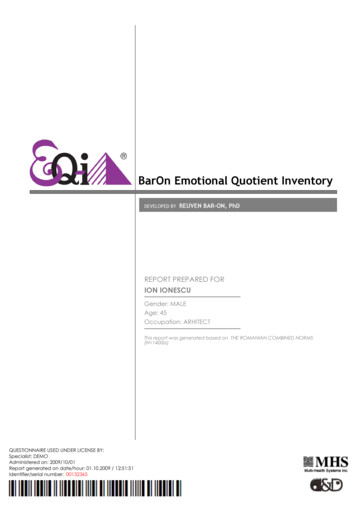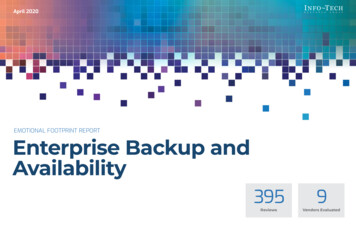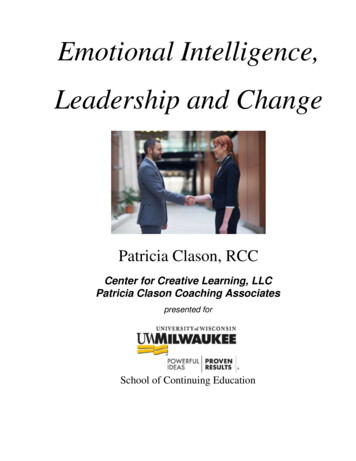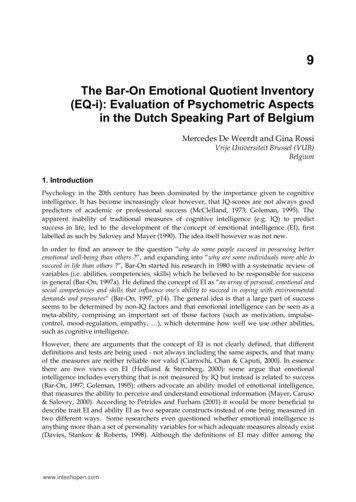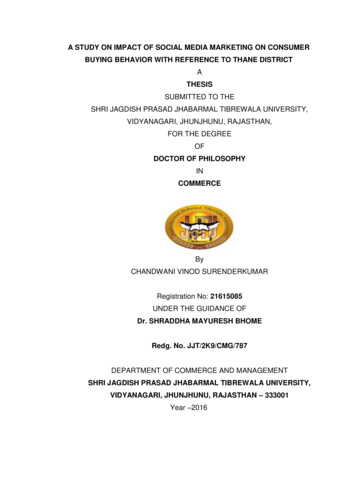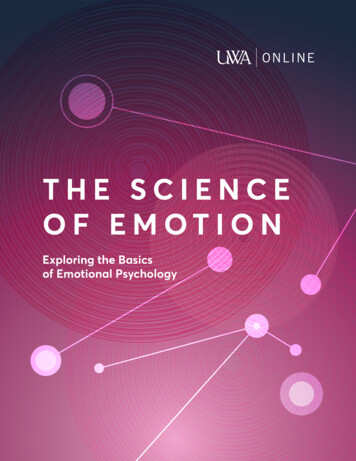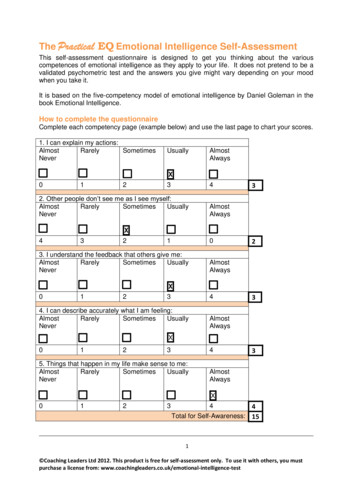
Transcription
ISSUE IEBR FPromoting Social andEmotional Learningin PreschoolPrograms and Practices that WorkPhoto: 2016 Tyrone TurnerThis issue brief, created by The Pennsylvania State University with support from theRobert Wood Johnson Foundation, is one of a series of briefs that addresses the needfor research, practice and policy on social and emotional learning (SEL). SEL is definedas the process through which children and adults acquire and effectively apply theknowledge, attitudes, and skills necessary to understand and manage emotions, setand achieve positive goals, feel and show empathy for others, establish and maintainpositive relationships, and make responsible decisions.Learn more at www.rwjf.org/socialemotionallearning.1 The Pennsylvania State University 2017 May 2017
ISSUE IEBR FExecutive SummaryOver the past 15 years, the U.S. has increasingly emphasized achievement tests as an indexof school performance and in response, kindergartens have become increasingly academicin focus.1 Preschools have responded to this shift, recognizing the need to better preparechildren for the academic demands of kindergarten. This amplified emphasis on preschoolacademic learning has raised concerns that children’s social-emotional (SE) needs are beingcrowded out of preschool priorities, despite consensus that early social-emotional skills arean important component of school readiness and healthy child development.2 PreschoolSE skills include being able to get along and cooperate with others, manage strong feelings,focus attention, and persist at challenging tasks. These skills deserve focused attention duringthe preschool years because they are critical for long-term school and life success.3,4This brief summarizes what is known about effective preschool social-emotional learning(SEL) programs and practices based on high-quality, rigorous research studies that utilizedrandomized controlled designs. These studies demonstrate that evidence-based SELprogramming produces positive impacts on children’s development of SE skills, enhancingtheir learning engagement, interpersonal relationships, behavioral adjustment, and schoolsuccess. Proven SEL programs are particularly effective when they:1. Improve teachers’ classroom management and the quality ofteacher-student interactions;2. Include SE skill-building for preschool students;3. Integrate with academic enrichment programs;4. Use professional development to promote high-fidelity implementation; and5. Involve parents.All children benefit from SEL programming, but the benefits are even greater for children withdelays in SE skill development associated with early socioeconomic disadvantage. Effectivelyengaging parents in these efforts enhances impact.5 Future challenges include bringing SELprograms to scale while maintaining a high level of program quality, finding ways to moreeffectively and efficiently integrate evidence-based programming into preschool practice,engaging parents, and learning how to increase sustained gains that benefit children in theyears after they enter kindergarten.2 The Pennsylvania State University 2017 May 2017More U.S. childrenare attendingpreschool than everbefore, providingnew opportunitiesto support earlylearning anddevelopment.
ISSUE IEBR FIntroductionIn many ways, kindergarten has become the new first grade. Over the past15 years, public school goals for academic attainment in kindergarten haveincreased and kindergartens have become increasingly academic in focus.1More U.S. children are attending preschool than ever before, providingnew opportunities to support early learning and development. As a result,kindergarten teachers increasingly expect children to learn basic knowledgeabout letters, numbers, and colors before they enter kindergarten.1However, many educators and researchers worry that a narrow focus on earlyacademic knowledge and skills may actually undermine educational attainment,as well as a child’s long-term school adjustment, by reducing the focus on achild’s social-emotional development in the early school years.5,6 The concernis two-fold:1. A primary focus on academics may be stressful for children, diminishingtheir self-efficacy, attitudes toward school, and academic motivation.2Kindergarten teachersreport three importantSEL skills needed forschool readinessCan follow directions2. Pursued dogmatically, a focus on academics fails to support and may evenundermine SE skill development that children need to sustain a positiveorientation toward and engagement in school and learning.6In addition, SEL is itself an important component of healthy child development,and many recognize the important role schools play in supporting areas ofdevelopment that are not strictly academic.7Despite the increasingly academic focus of kindergarten, kindergarten teacherscontinue to believe in the importance of SE skills for learning. For example, 91percent list “can follow directions” as a critical kindergarten readiness skill, 87percent list “takes turns and shares”, and 77 percent list “pays attention.”1 As of2016, 49 of the 50 U.S. states had created SEL standards for the preschool years,reflecting a remarkable level of national consensus in support of teaching SELin preschools.8An extensive body of research validates these teachers’ perceptions, showingthat children’s SE skills provide an essential foundation for social, behavioral,and academic success in school.4 New evidence also suggests that theseskills link to better physical health. For example, improving SE skills promoteshealthier lifestyles, reduces risky behavior such as substance use, and has beenlinked with lower BMI.9,103 The Pennsylvania State University 2017 May 2017Takes turns and sharesPays attention
ISSUE IEBR FFurthermore, the capacities to get along with others, follow classroom rules and routines,pay attention, and persist at challenging tasks predict greater enjoyment of school,fewer problem behaviors, and elevated rates of high school graduation and productiveemployment.3 Indeed, research on model programs, such as Perry Preschool, suggests thatfor children growing up in poverty, preschool may have its strongest impact on later wellbeing by boosting early SE skills, which are linked with later educational attainment, reducedrisky behaviors, and better employment and health outcomes.11Unfortunately, many children enter kindergarten unprepared for the social-emotional andbehavioral demands of school, as well as the academic demands. Children growing up inpoverty are particularly likely to show delays in the social-emotional and self-regulation skillsneeded for school success, due in part to their heightened levels of stress and low levelsof early learning support.12 Not only do these delays in SE development impede learning,they also increase the risk for behavior problems and discipline difficulties in preschooland contribute to elevated rates of preschool suspension and expulsion.13 Almost half ofpreschool children are growing up in low-income families,14 creating a critical need tosupport SE development in preschool programs.A variety of programs and practices are available for preschool teachers to support thedevelopment of early SE skills before children enter kindergarten. In the following sections,we review evidence-based programs and practices that have proven effective in promotingchild SE skills and school success. The programs and practices vary in the number and typeof SE skills they target.High stress andlow levels of earlylearning supportcan prevent childrenwho grow upin poverty fromdeveloping thesocial-emotionalskills they need tosucceed in school.Some focus primarily on the interpersonal skills associated with positive adaptive functioningin school – getting along with others, making friends, sharing, cooperating, taking turnsand controlling aggressive behavior.15 Others place more emphasis on intrapersonal skills,including emotion regulation (e.g., identifying and managing emotions, and developingempathy)16 or cognitive control (e.g., focusing attention, flexible problem-solving).17 OtherSEL programs are comprehensive and address all of these skills, using prescribed classroomactivities along with a strong emphasis on professional development support for teachers.18Photo: 2008 Tyrone Turner4 The Pennsylvania State University 2017 May 2017
issueISSUE IEBRbriefFKey FindingsSeveral evidence-based programs have proven effective inpromoting critical SE skills during the preschool years.Effective SELEnriching early learning with SE programming promotes the self-regulation and socialskills children need to gain the most benefit from schooling.19 Longitudinal research linksearly SE skills with a wide array of positive adult outcomes, including positive mentalhealth, interpersonal relationships, educational attainment, civic engagement, productiveemployment, and physical health in later life.3,9,10,18 Rigorous randomized trials provide strongevidence that these skills can be promoted during the preschool years with the use ofevidence-based programs.20,21,22positive impactsAlthough more long-term follow-up studies are needed, building SE skills in preschoolmay have long-term benefits for all children, especially those growing up in disadvantagedcircumstances.12 Poverty is associated with heightened exposure to stressors (e.g., crowdedand unsafe living conditions, low parent education, family instability, single-parenting,neighborhood crime, etc.) and with lower-quality school and early learning options, whichtogether undermine positive SE development.23 Providing children with preschool SEL maybuild their resilience to cope with stressors as they get older.24As noted below, effective programs vary in their approach, with differential emphasis onSE skill domains (e.g., social-behavioral, emotional, self-regulatory skills) and varying levelsof teacher professional development and explicit in-class lessons. However, they havein common an intentional and intensive focus on teaching practices that support SE skillacquisition. Several resources provide updated reviews for practitioners and policymakers onevidence-based SEL programs, including the Blueprints for Healthy Youth Development,25 theNational Registry of Evidence-based Programs and Practices (NREPP),26 and the Collaborativefor Academic, Social, and Emotional Learning Guide.27programs haveSEL Programs Improve classroommanagement Include skillbuilding Integrate withacademics Use professionaldevelopment Involve parentsImmediate Results Follow directions Pay attention Persist atchallenging tasks Greater enjoymentof school Fewer problembehaviorsLong-Term ResultsPromoting positive classroom management and improvingteaching quality supports SE growth.Teachers influence preschoolers’ SE skills through their classroom rules and expectations,the quality of their interactions with students, and the strategies they use to encouragedesired behaviors and discourage aggressive or disruptive behaviors.28 Programs that helpteachers set clear expectations, attend to and praise positive behaviors, provide emotionalsupport, and set limits in non-punitive ways foster improved social behavior.For example, the Incredible Years Teacher Training Program (IYTTP)29 provides teacherswith monthly workshops focused on key concepts for positive classroom management,videotape reviews, group discussions, and consultation around teacher examples andpractices. Four randomized-controlled studies have shown that IYTTP produces significantdecreases in classroom behavior problems.29,30,31,32 In two of these studies, children alsoshowed improvements in learning behaviors and emotional skills.31,335 The Pennsylvania State University 2017 May 2017 Positive mentalhealth Higher rates of highschool graduation Productiveemployment Reduce riskybehavior More civicengagement
ISSUE IEissueBR FbriefAnother example is the BEST in CLASS program which provides teachers with in-classcoaching to help them apply positive behavioral management strategies with studentsexhibiting challenging behaviors. An initial randomized trial documented improvedclassroom management, more positive student-teacher interactions, and reductions inchild problem behaviors.34 By providing teachers with positive management strategies,these programs seek to enhance their capacity to help children with challenging behaviors,thereby reducing the risk of preschool suspensions or expulsions.Skill-based SEL programs combined with professional developmentfor teachers optimize SE growth.Teachers support children to use the skills in their everyday interactions, and teachersstrengthen these skills by praising their efforts and providing corrective feedback.20 Thisapproach has proven effective in teaching children cooperative problem-solving skills andstrategies for resolving peer conflicts, which in turn, reduce impulsive behaviors in theclassroom and promote frustration tolerance and active learning.35,36Similarly, SEL lessons have proven effective at helping students learn to recognize andcommunicate about emotions, giving children the language and self-regulation skills theyneed to manage strong feelings and control aggression.16,17 For example, students whoreceived the Emotions-Based Prevention Program37 in a randomized trial showed improvedemotion knowledge, less negative emotional expression, less aggressive behavior, andimproved social competence.Some programs have used strategically designed, socio-dramatic play and physical activitiesto promote self-regulation skills and help children learn to control their attention and inhibitimpulsive behavior.17,38 For example, in the Red Light, Purple Light program, children playgames to practice self-control, such as “Simon Says.”39,40 In the Tools of the Mind program,teachers help foster complex pretend play and boost interpersonal negotiation skills inchildren.41 An initial quasi-experimental study suggested considerable potential for thisapproach.42,43 However, three recent randomized trials suggest that it is difficult to implementwith high fidelity and intensity, and it produced no effects on SE skills, behavioral adjustment,or academic skills.31,44,45In general, SEL programs promote benefits in the skill domains that they target. Whilethe programs above focused on one or two specific SEL skills, a growing set of studiessupport the effectiveness of comprehensive SEL programs, which combine multiple skillbased lessons and activities to promote skills in multiple SEL domains. A good exampleis the Preschool PATHS Curriculum.46 PATHS includes classroom lessons on social skills,6 The Pennsylvania State University 2017 May 2017Photo: 2015 Flynn LarsenAlthough focusing on classroom management and teaching quality can improve studentoutcomes, including skill-focused SEL programming in preschool classrooms as well createsadditional benefits.22 Such programs promote social, emotional, and self-regulation skillsthrough short lessons in which teachers present skill concepts with stories, pictures, andpuppets. Children discuss and practice the skills in role play or planned activities.Some programshave used play andphysical activitiesto promote selfregulation skills,help children learnto control theirattention, and inhibitimpulsive behavior.
ISSUE IEissueBR Fbriefemotional knowledge, self-control, and social problem-solving. In addition, teachersreceive training in strategies to foster positive classroom management and help childrenuse the skills throughout the day.Preschool PATHS has been evaluated in four randomized trials. In an initial trial, it promotedgains in child emotion knowledge and on teacher and parent ratings of social competence.47In a second study, when combined with a literacy intervention (the Head Start REDI Program),children improved in emotion knowledge and social problem-solving skills, were moreactively engaged in learning, and showed reductions in teacher-rated aggression.48,49 In a thirdstudy, Preschool PATHS was combined with a web-based professional development program,MyTeachingPartner (MTP),50 and produced improvements in teacher-rated social competencies.Finally, Preschool PATHS was evaluated in a national randomized study, the Head Start CARESproject. It produced heightened levels of emotion knowledge and social problem-solving skills,and improved social competence as rated by teachers as well as stronger learning behaviors.31Other comprehensive SEL preschool programs have shown a similar pattern of benefits.For example, Al’s Pals produced improvements on teacher-rated child social skills andreductions in problem behaviors.51 In another study, the Dinosaur School Social Skillsand Problem Solving Program, in combination with the Incredible Years Teacher Trainingprogram, led to greater social-emotional competence, better social problem-solving skills,and less aggression.52Preschools should harness the power of integrated SEL andacademic enrichment programs.In the early childhood literature, “play-based” preschools that focus on SEL are oftenpitted pedagogically against “academically-oriented” preschools. Research is makingit clear that this is a false dichotomy. During early childhood, growth in academic skillis positively associated with growth in SEL skills. A meta-analysis of SEL interventionsfocused on older children found that SEL interventions produce gains in both SEL skills andacademic achievement.18 And evaluations of multi-component interventions, such as theHead Start REDI program, have shown that growth in SEL skills during preschool makesunique contributions to achievement in kindergarten.53 High-quality, preschool academicenrichments tend to be play-based54 and are likely to promote cognitive self-regulation skills(one aspect of SEL) as well as academic gains.55Emerging research also shows that the key to long-term benefits for all children, includingclosing the school readiness gap that affects children growing up in poverty, is thecombination of a preschool focus on SE skill development and cognitive enrichment.56 Forthis reason, preschools should focus on integrated programming that prepares childreneffectively for the academic demands of elementary school, and develops and nurtures theirSE skills. To address these dual needs requires the intentional and strategic implementation ofspecific programs and practices. Emerging research shows that these developmental goalsare not competing but intertwined. When evidence-based academic and social-emotionalprogramming are integrated, children enter school well-positioned to succeed, with socialemotional benefits that extend well into the later school years and beyond.20,21,227 The Pennsylvania State University 2017 May 2017During earlychildhood, growthin academicskill is positivelyassociatedwith growth inSEL skills.
ISSUE IEBR FHigh-fidelity implementation of SEL programs is key totheir success.The fidelity of program implementation refers to the degree to which teachers deliver theprogram in the way the program developers intended.57 It includes the amount of theprogram that is delivered, the degree to which teachers follow program guidelines, and thequality of teacher-child interactions during lessons and throughout the classroom day.57,58High-quality implementation predicts benefits for children.58,59In addition, high implementation delivery of an evidence-based SEL program during itsfirst year of use increases the likelihood that teachers will sustain the program and deliverit with high quality in subsequent years.60 In the randomized evaluations described inthis brief, multiple strategies were used to help teachers implement with high fidelity.These included the use of detailed manuals and guidelines, and ongoing coaching andconsultation, as well as initial workshop training.Including parents in preschool social-emotional developmentefforts can add value.Social-emotional development is heavily influenced by the quality of relationships childrenhave with their parents.61 Recognizing the potential benefits of including parents, several SELprograms (Preschool PATHS, Al’s Pals) include information sheets and suggestions for parentchild activities. In addition, a few studies have examined the utility of offering more intensiveparent interventions to parallel classroom SEL programs.For example, adding a formal parent component to an SEL classroom model in Head Startled to decreased child problem behavior at home, but only for the sub-set of children withelevated problems.29 Adding a parent program to the Head Start REDI model showed additionalbenefits beyond the classroom intervention, including sustained effects in social and peercompetence as well as academic performance in second grade.62Similarly, ParentCorps uses a combination of parent discussion groups, teacher-led friendshipsessions, and teacher-focused professional development support during preschool. Theprogram has shown to produce gains in child mental health and academic performance insecond grade. ParentCorps also showed improved physical health among children with highbehavioral risk at baseline (e.g., reduced obesity and sedentary behavior).63,64 It should benoted that these studies were typically able to recruit only 30% to 50% of the eligible parentsample and are more costly per child than classroom programs. Nonetheless, they suggestconsiderable potential and the need for additional research to explore options for parentinvolvement in preschool-based SEL programs.8 The Pennsylvania State University 2017 May 2017
ISSUE IEissueBR FbriefFuture Research NeedsThe results described in this brief are highly promising, and show that evidence-based SELprogramming can be implemented effectively in current preschool settings, promote socialemotional development, and enhance child learning engagement and school success. At thesame time, additional research in the following areas is needed to build on these studies andinform efforts to maximize benefits for all children.Sustained SELprogram benefitsare dependent ontwo factorsHowever, it is likely that simply reducing the scope or intensity of SEL programming belowthe levels used by these proven programs will reduce benefits to children.66 Researchsuggests that the amount of SEL programming children receive, as well as the amount ofprofessional development support teachers receive, are two important factors predicting thedegree of child benefits.59 Current research suggests that promoting substantial and lastinggains in child SE skills requires strategic and intensive efforts, and is not easily accomplishedby smaller investments such as providing a teacher workshop or increasing time for play.67On the other hand, preschools are rightly concerned about the burden that intensiveprogramming places on their budgets and personnel. For this reason, research is needed todetermine the specific SEL program elements and level of exposure that are needed to achievepositive and sustained outcomes. More knowledge regarding the critical features promotingoptimal outcomes could guide program developers in streamlining SEL program design.In addition, future research is needed to identify the most effective and efficient strategiesfor delivering professional development supports to teachers, and helping them becomeproficient at supporting children’s SEL throughout the day. One promising strategy involvesthe use of technology to improve the accessibility of high-quality coaching68 but moreresearch on its efficacy is needed.9 The Pennsylvania State University 2017 May 2017Amount of SEL skilltraining children receivePhoto: Tyrone TurnerCurrent pressures to prioritize cognitive development and academic school readiness inprekindergarten may motivate programs to use less extensive SEL programs and/or provide lessintensive professional development and coaching than provided in the context of the provenprograms described above. Correspondingly, some experts have argued from a conceptualstandpoint that SEL strategies might be identified and integrated throughout the school day inthe form of daily routines and reminders, without the need for a formal SEL curriculum.65Photo: 2014 Tyrone TurnerGain a better understanding of the critical elements and amount ofexposure needed to promote sustained growth in SE skills.Amount of professionalsupport teachers receive
ISSUE IEBR FDetermine how to scale across the range of early childhoodlearning programs.Studies described in this brief demonstrate that model programs can achieve considerablesuccess. However, evaluation trials have often been limited to contexts like Head Start orpublic prekindergarten that follow a “school-like” schedule with regular hours and routinesto support child engagement in learning activities. Yet there is considerable variability in thestructure of preschool programs.An important next step is to understand what changes in curriculum, training, and ongoingsupport will be necessary to scale up SEL programs for the wider range of center-basedprograms and preschool teachers. This includes research to understand what kind ofprogram approaches might be effective with mixed age and younger preschool children,as well as the 4-year-olds that are a focus of most of the studies described in this brief.It also includes research examining effective strategies for providing the professionaldevelopment needed by preschool teachers and child-care providers who have low levelsof formal education and training, including a high-school degree without additional training.Finally, more research is needed to determine how best to reach out and engage parentseffectively in coordinated home-school partnerships that promote child SE development.5Establish the longer-term benefits of SEL preschool programming.Recent re-analyses of early model preschool programs such as Perry Preschool andAbecedarian Program suggest that early gains in SEL skills may account for the long-termprogram benefits of high-school graduation, employment, and reduced crime.69 However,relatively few preschool SEL programs have collected follow-up data to determine howpreschool SEL programming affect later child outcomes. The few that exist have producedmixed findings with some showing no lasting benefits,31,70 or benefits only for children whoentered higher-quality elementary schools.71In contrast, two follow-up studies have produced more promising, long-term benefits. Inone national study, teachers indicated significantly lower rates of expected grade retentionfor kindergarten students who had received Preschool PATHS.31 In the Head Start REDIproject, the combination of a language and literacy intervention along with PATHS, revealedsustained social-emotional benefits in kindergarten, second grade, and third grade.60,72,73When a synchronized parent program was added to the classroom REDI program, additionalacademic benefits sustained through second grade.62Comprehensive, SE skill-building programs, along with classroom lessons and specificteaching strategies, may provide a stronger foundation for coping with the demandsof elementary school than a program that focuses primarily on external control duringpreschool. This is because the explicit instruction approach may more effectively promotechildren’s internal capacities to monitor and cope with social challenges.22 However, no studyhas yet compared the long-term value of a comprehensive skill-building SEL curriculumwith an effective classroom management program. More longitudinal follow-up studies areneeded to better understand the nature of sustained SEL program impact.10 The Pennsylvania State University 2017 May 2017Preschool SELprogramming hasthe potential toreduce the schoolreadiness gapassociated withgrowing up inlow-income homesand communities,when exposure toadversity is elevatedand child care andpreschools are oftenpoorly resourced.
ISSUE IEBR FConclusions and ImplicationsAuthors/AffiliationsTo promote school readiness, preschools need to focus strategically andintentionally on fostering social-emotional development. This includesproviding time for play and social interaction in preschool, and building uponthese opportunities for social-emotional learning by using evidence-based SELprogramming. Programs that focus on a single domain, such as emotions orcognitive regulation, tend to have discrete and limited effects. ComprehensiveSEL models that focus on multiple domains – social-behavioral, emotional,and cognitive self-regulatory skills and processes – are more likely to producebroader improvements. This is probably because these dimensions of socialemotional functioning are interdependent developmentally, and reinforceeach other over time. It is important to note that although most programs uselesson-based curricula, they also emphasize the critical role that supportiveteacher-child interactions play in fostering social-emotional growth.Karen Bierman, Ph.D., is an Evan PughUniversity Professor, and professor ofPsychology and Human Development andFamily Studies, College of the Liberal Artsat the Pennsylvania State University. MarkGreenberg, Ph.D, is the Bennett Endowed Chairin Prevention Research, founding director ofthe Bennett Pierce Prevention Research Centerfor the Promotion of Human Development, andprofessor of Human Development and FamilyStudies and Psychology, College of Healthand Human Development at the PennsylvaniaState University. Rachel Abenavoli, Ph.D., is aPostdoctoral Research Associate at the Instituteof Human Development and Social Changeat New York University’s Steinhardt School ofCulture, Education, and Human Development.The authors gratefully acknowledge AndrewMashburn, Ph.D. for his helpful comments onan earlier version of this brief.As the number of states with publicly funded prekindergarten programsincrease and the prevalence of four- and five-year-olds attending center-basedearly childhoo
Promoting positive classroom management and improving teaching quality supports SE growth. Teachers influence preschoolers’ SE skills through their classroom rules and expectations, the quality of their interaction
